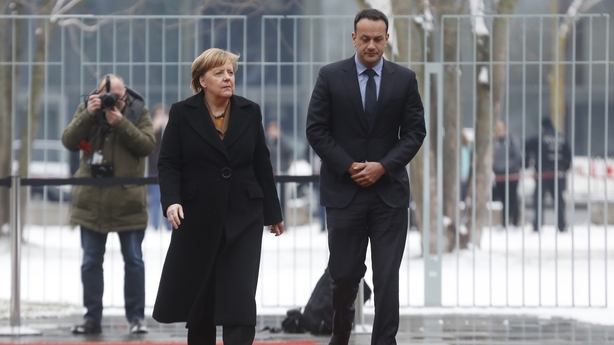Taoiseach Leo Varadkar discussed Brexit with German Chancellor Angela Merkel in Berlin today, his first visit to the German capital as Taoiseach.
The meeting came ahead of this week's European Council Meeting that could allow the talks between the European Union and the UK to begin looking at their future relationship.
The meeting comes a day after the EU and the UK agreed the backstop for the Irish border, agreed in December, must be part of the withdrawal agreement unless an alternative is found.
'Steady progress' in Brexit negotiations but more needs to be done to 'close the remaining gaps' pic.twitter.com/b4vFEF8biU
— RTÉ News (@rtenews) March 20, 2018
Ms Merkel described relations as "excellent" and said Germany fully supported Ireland's position on the sensitive issue around border.
Ireland could rely on Germany, she said.
The Taoiseach, who made a lengthy statement in German afterwards, said he believed that the German government is a friend of Ireland's and has a clear grasp of the complexity of the border issue.
Mr Varadkar and his counterparts will decide on Friday if enough progress has been made to move on to the issue of the future relationship between Britain and the EU in the Brexit negotiations.
Both leaders also discussed the issue of digital taxation and plans that are afoot in the European Commission to impose a turnover tax on big internet companies.
However, there was no consensus on this, with the Taoiseach saying again that any plans to tax big internet companies should be underpinned by a global agreement and it should be done slowly and correctly.
Ms Merkel was saying little about this publicly today, but it seems her preference is for more swift progress in this area.

Germany is Ireland's second largest source of inward investment, third largest source of tourists, fourth largest overall trading partner, and fifth largest food export market.
Following lengthy coalition negotiations after the federal elections last September, Chancellor Merkel was formally re-elected to her position for the fourth time by the Bundestag last week.
Elsewhere, the European Union's Brexit negotiator, Michel Barnier, has said he expected the most difficult negotiations with Britain to come at the end of the process.
"We are not at the end of the road. My experience of negotiations, even if this is an extraordinary and unique one, is that what remains at the end is often the most difficult," Mr Barnier told reporters.
Apart from the key outstanding issue - how to avoid a border on the island of Ireland - Mr Barnier said other elements that were still not agreed related to data protection, geographical indications of various goods or the automatic recognition of each others' court rulings.
European Council President Donald Tusk has warned there is no guarantee that EU leaders will accept the agreement on the terms of the UK's withdrawal when they meet in Brussels this week.
Mr Tusk has said that he needs more time to consult with "some of the most concerned member states" ahead of their two-day summit starting on Thursday.
The leaders of the remaining 27 had been expected to rubber stamp the agreement - including the transitional arrangements after the UK leaves in March 2019 - finalised by Mr Barnier and UK Brexit Secretary David Davis yesterday.







